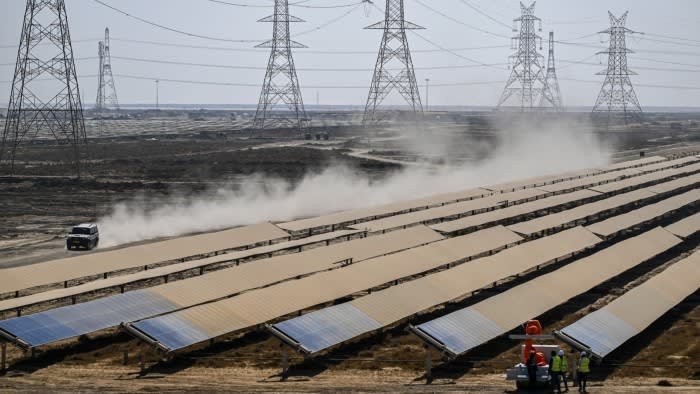Indian companies are moving to fill the gap left by the exclusion of Chinese exports from the fast-growing US solar industry, as Washington steps up its crackdown on manufacturers with ties to Beijing.
Sumant Sinha, chief executive of ReNew, among India’s largest renewables companies, told the Financial Times that there “will be demand” for solar components from India as Washington reduces reliance on Chinese supplies for its energy transition.
“There is a need for some diversification, and India can actually become that plus one to China as far as the green tech supply chain is concerned,” Sinha said.
He added that ReNew was considering exporting to the US from its solar factories in India pending US tariff rules. “[India] will fill the gap.”
Washington is weighing additional tariffs on solar imports to protect the domestic industry after a flood of Chinese-produced panels drove global prices to record lows.
Last week, the Department of Commerce released preliminary estimates of duties as high as 293 per cent for solar cell exporters in four countries in south-east Asia, where the US sources the bulk of its solar supplies, often from Chinese companies.
The looming decision has driven developers and manufacturers to look beyond the region to markets not subject to tariffs. Wood Mackenzie expects cell manufacturing in countries outside of the main hubs of China and south-east Asia to more than double over the next couple of years, with India making up 40 per cent of new capacity.
“There’s no modular manufacturer in India who is not thinking of exporting,” said Subrahmanyam Pulipaka, chief executive of the National Solar Energy Federation of India, a lobbying group that counts big developers such as Adani Group, Tata Power and ReNew among its members.
US imports of Indian panels and cells surpassed $1.8bn last year, up from about $250mn the year before, according to BloombergNEF.
Indian manufacturers are also investing in US factories following President Joe Biden’s landmark Inflation Reduction Act, which included lucrative subsidies for domestic producers, with Waaree and VSK Energy announcing manufacturing commitments worth at least $1bn each last year.
“The main advantage is that they’re not Chinese,” said Martin Pochtaruk, chief executive of Heliene, which operates a solar panel factory in Minnesota.
The company used to source its cells from Vietnam and Malaysia, but now purchases primarily from India to insulate itself from new tariffs. In July, Heliene announced a $150mn joint venture with Premier Energies, India’s second-largest solar cell manufacturer, to build a US factory.
The Biden administration has raised protections against solar imports with ties to Beijing, doubling the duty rate for Chinese cells, applying anti-circumvention tariffs on Chinese companies in south-east Asia, and banning goods linked to forced labour in Xinjiang. The White House also maintained Trump-era tariffs that applied to solar products from most countries.
Despite the efforts, US imports of panels sit at record highs. Several manufacturers, including VSK Energy, have delayed or scrapped their US manufacturing plans despite the availability of federal tax credits.
“Tariffs haven’t worked,” said Pol Lezcano, a senior analyst at BloombergNEF.
“Manufacturers don’t come to the US. They don’t really find the right business and supply chain environment that they need to scale up manufacturing.”
Rapidly declining prices for imported panels have helped transform solar into the leading source of new power on the US grid. The Energy Information Administration expects solar installations this year to grow 42 per cent, reaching 127 gigawatts.
In April, the largest US solar manufacturers, First Solar and Qcells, and others filed a petition for tariffs on cells to be applied to four countries in south-east Asia in order to rescue a struggling domestic industry.
Luigi Resta, president of rPlus Energies, a developer, warned that the tariffs would slow down the pace of deployment and raise prices for consumers. The company has started to source from Indonesia, another emerging solar manufacturing market, to safeguard it against trade impacts.
“The nature of the industry is that we have to be very flexible,” Resta said. The company now sources about 1GW of panels between Indonesia and Vietnam.
Industry executives and analysts expressed concern that plans to build production lines in tariff-exempt markets may lead the US government to play a game of “Whac-A-Mole” with tariffs and fine those countries in the future, risking billions in capital expenditure.
“If too many people go to one place, it just ruins it for everybody,” said Jim Wood, chief executive of SEG Solar.
Last week the company broke ground on a $500mn factory near Jakarta, which will help supply cells to its panel factory in Texas.
Climate Capital

Where climate change meets business, markets and politics. Explore the FT’s coverage here.
Are you curious about the FT’s environmental sustainability commitments? Find out more about our science-based targets here


